上海牛津版英语六年级第一学期6A期末复习知识点总结
6A上海牛津英语六年级第一学期重点词组和句型1
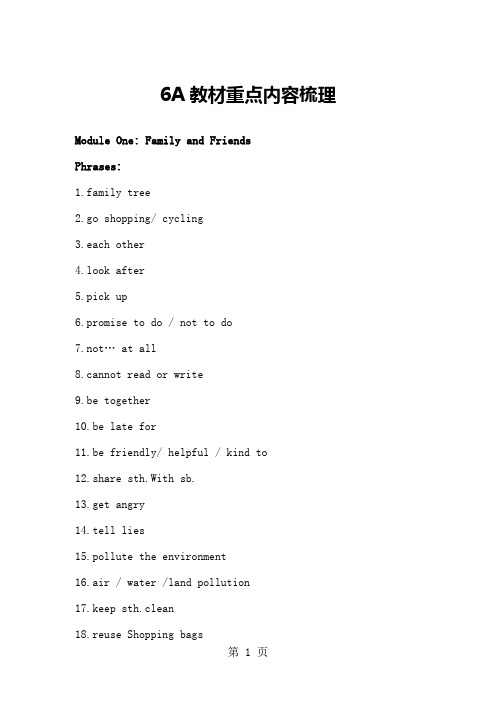
6A教材重点内容梳理Module One: Family and FriendsPhrases:1.family tree2.go shopping/ cycling3.each other4.look after5.pick up6.promise to do / not to do7.not… at all8.cannot read or write9.be together10.be late for11.be friendly/ helpful / kind to12.share sth.With sb.13.get angry14.tell lies15.pollute the environment16.air / water /land pollution17.keep sth.clean18.reuse Shopping bags19.put rubbish into rubbish bins20.leave rubbish21.friends of the earth22.discuss sth.With sb.23.at weekends/at the weekend24.a photo of sb25.be near / far from …26.have lunch /dinner/ a picnic/ a barbecue27.fly kites28.ride bicycles29.make sandcastles30.collect shellsSentence patterns:1.A: How many brothers/… do you have?B: I (only) have one brother.2.A: what do you do with your …?B: I always/usually/ sometimes play games with ….A: What else do you do with sb.?B: I sometimes … with …3.A: Have you been to …?B: I have just/already been to … / there./ I haven’t been to …/there yet.4.What about/How about + n./ving…?5.A: What do you usually do at weekends?B.I usually …6.A: Is … near or far away from …?B.It is near/ far away from….7.A: Where have you been?8.B: I have been to….9.Which place shall we visit?10.When shall we go there?11.What time?12.When are we going to come back?13.How are we going to get there?14.How much does it cost?Module Two: Places and Activities Phrases:1.a bank clerk2.a shop assistant3.put out fires4.cook food5.make our city a safe place6.look at7.listen to8.arrive at9.have tea10.at the entrance11.on the ground/ first floor12.on the open day13.at half past eight in the morning14.First,../ Next,… /Then,… /After that,…/Finally, …15.take photos16.by ferry/ by underground/ on foot17.on the bus18.go to school19.a lot of/ some/ a few20.live near/far away from school21.an advertisement board22.light rail23.a department store24.a housing estate25.a police station26.half an hour27.wait for28.walk on the grass29.keep quiet30.run across the road31.pick the flowers32.turn left/right33.on the right/left34.in the middle35.go upstairsSentence patterns:1.A: Would you like to be a/an…?B: Yes, I would.//No, I wouldn’t.A: Why?/Why not?B: I would /wouldn’t like to be a/an…because I…2.A: What would you like to be?B: I would like to be…3.A: Do you live near or far away from …?B: I live near/far away from ….A: How do you go to school?B: I go to school by…/on foot.A: How long does it take?B: It takes …4.A: How long does it take you to get to…?B: It takes me about…to get there.5.A: What does Simon see when he is walking to school?B: Simon sees ...when he is walking to school.6. What does this sign mean?7. We must not eat or drink./Don’t eat or drink.8. We must …9. A: Which escalator must we use?B: We must use the one in the middle.Module Three: Food and Drinkphrases1.fried cabbage/chicken wings2.steamed prawns with garlic3.boiled eggs4.a shopping list5.at the vegetable stall6.in the frozen food section7.in the market/supermarket8.have a picnic9.a bottle of jam10.a packet of nuts 11.a slice / slices of12.an unhealthy diet13.do exercise14.live in the countryside15.stay with sb.16.plenty of / a lot of17.a little/ some18.my favourite breakfast19.too much spicy food20.eating habits21.the food pyramidSentence patterns:1.A: What would you like for dinner tonight?B: I’d like … for dinner.A: What kind of … would you like?Would you like … or …?B: I’d like…2.A: Have you bought any…?B: Yes, I’ve bought some…A: Where did you buy it/them?B: In the market, at the…stall/in the…section.A: How much was it/were they?B: It was /They were…yuan.3.A: Shall we buy some soft drinks?B: Ok./ That’s a good idea.4.Let’s buy some bread and a bottle of jam.Let’s go to the supermarket to buy some food and drink for the picnic.5.A: Would you like some…?B: No, thanks / yes, please6.A: Why do you like…?B: I like it/them because it’s/they’re sweet/delicious/tasty/spicy.7.A: Why not?B: I don’t want … because it is too ….8.A: May I have some …, please?9. B.Ok/ Sure/ All right/ Yes, you may.Here you are.//NO, youmay not./ I’m afraid you can’t..10.A: How much sugar do we need every day?B: We need a little sugar every day.11.A: Which one was healthier/less healthy?B: …’s diet was healthier than/less healthy than/as healthy as/as unhealthy as …’s diet.12.How much … do we need?13.What do you usually have for breakfast/ lunch /dinner?14.A: What did you have for breakfast yesterday?。
牛津沪教版六年级上6AUnit1-Unit2重要知识点复习
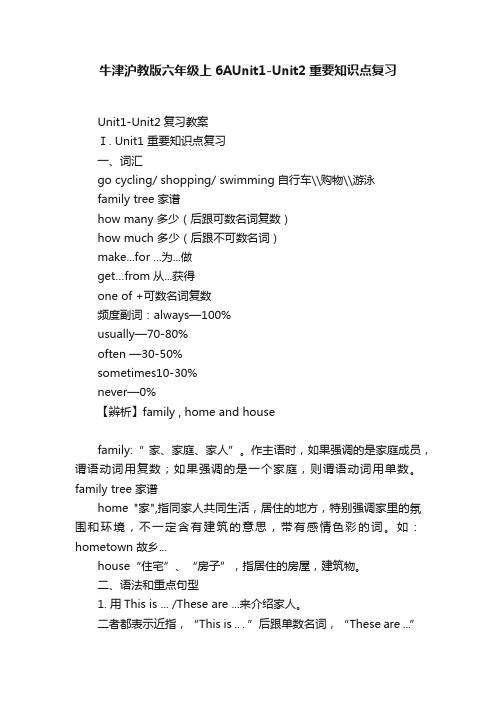
牛津沪教版六年级上6AUnit1-Unit2重要知识点复习Unit1-Unit2复习教案Ⅰ. Unit1 重要知识点复习一、词汇go cycling/ shopping/ swimming自行车\\购物\\游泳family tree 家谱how many 多少(后跟可数名词复数)how much 多少(后跟不可数名词)make...for ...为...做get…from从...获得one of +可数名词复数频度副词:always—100%usually—70-80%often —30-50%sometimes10-30%never—0%【辨析】family , home and housefamily:“ 家、家庭、家人”。
作主语时,如果强调的是家庭成员,谓语动词用复数;如果强调的是一个家庭,则谓语动词用单数。
family tree 家谱home "家",指同家人共同生活,居住的地方,特别强调家里的氛围和环境,不一定含有建筑的意思,带有感情色彩的词。
如:hometown 故乡...house“住宅”、“房子”,指居住的房屋,建筑物。
二、语法和重点句型1. 用This is ... /These are ...来介绍家人。
二者都表示近指,“This is .. . ”后跟单数名词,“These are ...”后跟复数名词或者多个不同的对象。
2.用how many 来询问数量后接可数名词的复数形式,当我们提问你有多少……时候,如果How many后跟人,常用how many... do you have?如果How many 后跟物,常用how many...have you got?3.What do you do with your... ? 和What else do you do with your... ? 来提问与家庭成员或亲戚一起做什么.else 意为别的其他的,常用于特殊疑问词或不定式之后,如what else, something else等。
牛津沪教版六年级上6A-Unit 1 知识点梳理 + 拓展阅读

6A Module 1 Family and friendsUnit 1 Family and relatives知识点梳理I. Useful words and expressions1. family与relativesfamily通常指自己的父母、兄弟姐妹等成员。
Relatives指的是除此之外与自己有血缘关系或非血缘关系的亲属。
2. 中英家庭称谓区别grandfather: 祖父,外祖父;grandmother: 祖母,外祖母;uncle: 叔父,舅舅,姨夫,姑父;aunt: 姑姑,姨母,婶婶,舅母;cousin: 堂兄弟姐妹,表兄弟姐妹;3. Alice has got a lot of presents and birthday cards from her family and relatives.a lot of 许多大量,后面加可数名词复数或不可数名词,相当于lots of。
get sth. from sb.: 从某人那里得到某物。
4. These are my uncles and this is my aunt.在介绍人物时,常用this is或these are这种句型,而不用使用he/she is, they are句型。
5. – Alice, what do you do with your aunt? – I usually go shopping with my aunt.问句中出现的第一个do是助动词,用于对实意动词的一般疑问句提问,其否定句形式是don’t。
同样作用的助动词还有does和did。
go shopping 去购物。
动词go后面跟动词时,常常接动词的-ing形式。
e.g., go swimming去游泳go cycling去骑车go fishing去钓鱼go camping去野营6. I always play football with my father.动词play后直接跟球类运动时,不需要加定冠词the。
牛津沪教版六年级上6AUnit1-Unit2 重要知识点复习
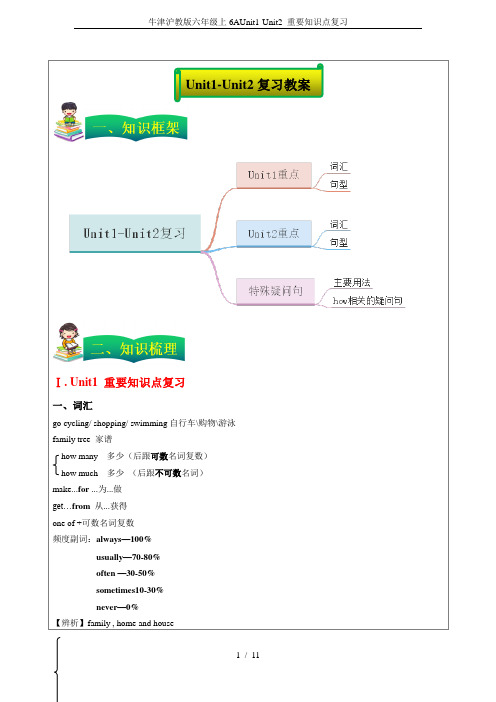
Unit1-Unit2复习教案Ⅰ. Unit1 重要知识点复习一、词汇go cycling/ shopping/ swimming自行车\购物\游泳family tree 家谱how many 多少(后跟可数名词复数)how much 多少(后跟不可数名词)make...for ...为...做get…from从...获得one of +可数名词复数频度副词:always—100%usually—70-80%often —30-50%sometimes10-30%never—0%【辨析】family , home and housefamily:“ 家、家庭、家人”。
作主语时,如果强调的是家庭成员,谓语动词用复数;如果强调的是一个家庭,则谓语动词用单数。
family tree 家谱home "家",指同家人共同生活,居住的地方,特别强调家里的氛围和环境,不一定含有建筑的意思,带有感情色彩的词。
如:hometown 故乡...house“住宅”、“房子”,指居住的房屋,建筑物。
二、语法和重点句型1. 用This is ... /These are ...来介绍家人。
二者都表示近指,“This is .. . ”后跟单数名词,“These are ...” 后跟复数名词或者多个不同的对象。
2.用how many 来询问数量后接可数名词的复数形式,当我们提问你有多少……时候,如果How many后跟人,常用how many... do you have?如果How many 后跟物,常用how many...have you got?3.What do you do with your... ? 和What else do you do with your... ? 来提问与家庭成员或亲戚一起做什么.else 意为别的其他的,常用于特殊疑问词或不定式之后,如what else, something else等。
上海牛津6年级第一学期知识点总结梳理
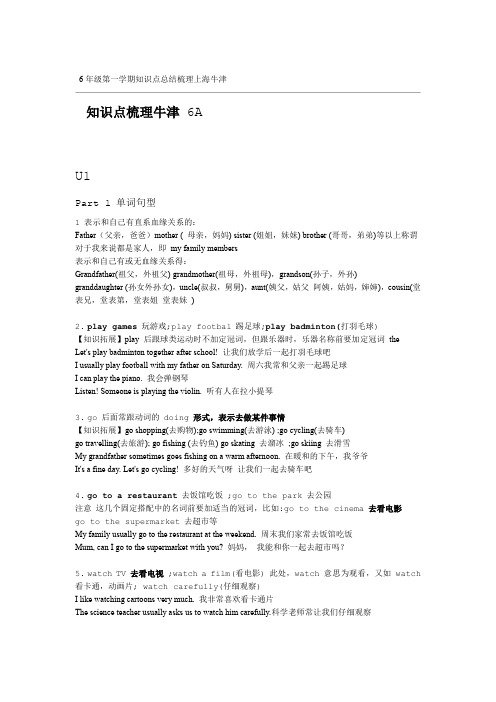
6年级第一学期知识点总结梳理上海牛津知识点梳理牛津6AU1Part 1 单词句型1 表示和自己有直系血缘关系的:Father(父亲,爸爸)mother ( 母亲,妈妈) sister (姐姐,妹妹) brother (哥哥,弟弟)等以上称谓对于我来说都是家人,即my family members表示和自己有或无血缘关系得:Grandfather(祖父,外祖父) grandmother(祖母,外祖母),grandson(孙子,外孙)granddaughter (孙女外孙女),uncle(叔叔,舅舅),aunt(姨父,姑父阿姨,姑妈,婶婶),cousin(堂表兄,堂表第,堂表姐堂表妹)2.play games 玩游戏;play footbal 踢足球;play badminton(打羽毛球)【知识拓展】play 后跟球类运动时不加定冠词,但跟乐器时,乐器名称前要加定冠词theLet's play badminton together after school! 让我们放学后一起打羽毛球吧I usually play football with my father on Saturday. 周六我常和父亲一起踢足球I can play the piano. 我会弹钢琴Listen! Someone is playing the violin. 听有人在拉小提琴3.go 后面常跟动词的doing 形式,表示去做某件事情【知识拓展】go shopping(去购物);go swimming(去游泳) ;go cycling(去骑车)go travelling(去旅游); go fishing (去钓鱼) go skating 去溜冰;go skiing 去滑雪My grandfather sometimes goes fishing on a warm afternoon. 在暖和的下午,我爷爷It's a fine day. Let's go cycling! 多好的天气呀让我们一起去骑车吧4.go to a restaurant 去饭馆吃饭;go to the park 去公园注意这几个固定搭配中的名词前要加适当的冠词,比如:go to the cinema 去看电影go to the supermarket 去超市等My family usually go to the restaurant at the weekend. 周末我们家常去饭馆吃饭Mum, can I go to the supermarket with you? 妈妈,我能和你一起去超市吗?5.watch TV 去看电视;watch a film(看电影) 此处,watch 意思为观看,又如 watch 看卡通,动画片; watch carefully(仔细观察)I like watching cartoons very much. 我非常喜欢看卡通片The science teacher usually asks us to watch him carefully.科学老师常让我们仔细观察6.本单元出现了三个频度副词:always 总是,一直usually 经常,常常sometimes 有时We should always help each other. 我们始终应互相帮助1 / 22年级第一学期知识点总结梳理上海牛津6晚饭后我父亲经常出去散步goes out for a walk after dinner.My father usually做完作业后她有时候会看电视She sometimes watches TV after homework.Part 2 重点语法1)A :How many + 名词复数+ do you have ?B :I only have one……/ I have (number)……2)A :What (else)do you do with your + 名词?B :I always / usually / sometimes / never do sth. with my + 名词Introduction 介绍:This is ……/ These are ……Express good wishes 表示祝愿:Happy birthday !3)频度副词always ,usually ,often ,sometimes 和never 在一般现在时中的用法:放在be 动词、助动词后面,放在行为动词前面。
牛津英语6A期末复习汇总
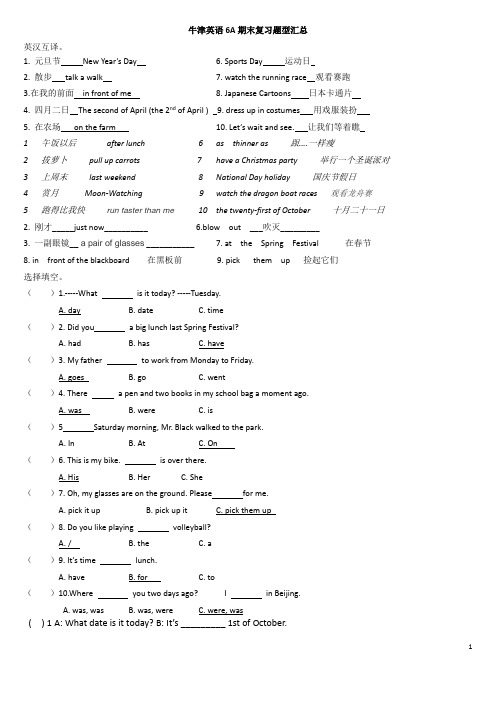
牛津英语6A期末复习题型汇总英汉互译。
1. 元旦节New Year’s Day 6. Sports Day 运动日2. 散步talk a walk 7. watch the running race 观看赛跑3.在我的前面in front of me 8. Japanese Cartoons 日本卡通片4. 四月二日The second of April (the 2nd of April ) 9. dress up in costumes 用戏服装扮5. 在农场on the farm 10. Let’s wait and see.让我们等着瞧1 午饭以后after lunch 6 as thinner as 跟....一样瘦2 拔萝卜pull up carrots 7 have a Christmas party 举行一个圣诞派对3 上周末last weekend 8 National Day holiday 国庆节假日4 赏月Moon-Watching 9 watch the dragon boat races 观看龙舟赛5 跑得比我快run faster than me 10 the twenty-first of October 十月二十一日2. 刚才_____just now__________ 6.blow out ___吹灭_________3. 一副眼镜__ a pair of glasses ___________ 7. at the Spring Festival 在春节8. in front of the blackboard 在黑板前9. pick them up 捡起它们选择填空。
()1.-----What is it today? -----Tuesday.A. dayB. dateC. time()2. Did you a big lunch last Spring Festival?A. hadB. hasC. have()3. My father to work from Monday to Friday.A. goesB. goC. went()4. There a pen and two books in my school bag a moment ago.A. wasB. wereC. is()5 Saturday morning, Mr. Black walked to the park.A. InB. AtC. On()6. This is my bike. is over there.A. HisB. HerC. She()7. Oh, my glasses are on the ground. Please for me.A. pick it upB. pick up itC. pick them up()8. Do you like playing volleyball?A. /B. theC. a()9. It’s time lunch.A. haveB. forC. to()10.Where you two days ago? I in Beijing.A. was, wasB. was, wereC. were, was( ) 1 A: What date is it today? B: It’s _________ 1st of October.A. aB. /C. anD. the( ) 2 What holiday _______ after May Day?A. comeB. comesC. comingD. came( ) 3 That girl _____ her grandma and her grandpa last Friday.A. visitB. visitsC. visitedD. visiting( ) 4 _______ ate many noodles last Sunday.A. Mike and IB. I and MikeC. I and mikeD. Me and Mike( ) 5 A: What ______ you do? We flew the kites. 【flew fly的过去式】A. didB. doC. doesD. don’t( ) 6 Jim and Ben are _____ about Be n’s birthday.A. talkB. sayingC. speakingD. talking( ) 7 Where are my shoes? _______.A. It’s on the desk.B. It’s under the deskC. They’re under the desk.D. It’s here.( ) 8 I t is an _____ day, we are all ______.A. excited, excitingB. exciting, excitingC. exciting, excitedD. excited, excited( ) 9 We usually _______ moon cakes at Mid-Autumn Festival.A. eatB. eatedC. ateD. eats( ) 10 Whose book is it? It’s not _____ book. It’s _____.A. my. herB. mine, hersC. mine, herD. my, hers选择题。
牛津小学英语6A复习提纲
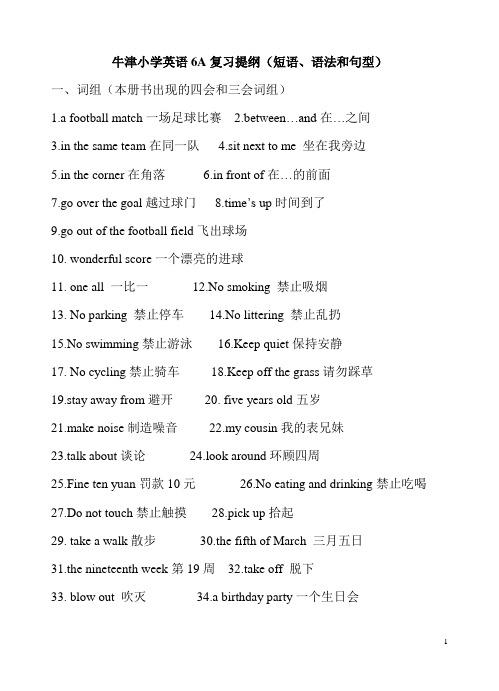
牛津小学英语6A复习提纲(短语、语法和句型)一、词组(本册书出现的四会和三会词组)1.a football match一场足球比赛2.between…and在…之间3.in the same team在同一队4.sit next to me 坐在我旁边5.in the corner在角落6.in front of在…的前面7.go over the goal越过球门8.time’s up时间到了9.go out of the football field飞出球场10. wonderful score一个漂亮的进球11. one all 一比一 12.No smoking 禁止吸烟13. No parking 禁止停车 14.No littering 禁止乱扔15.No swimming禁止游泳16.Keep quiet保持安静17. No cycling禁止骑车18.Keep off the grass请勿踩草19.stay away from避开 20. five years old五岁21.make noise制造噪音22.my cousin我的表兄妹23.talk about谈论 24.look around环顾四周25.Fine ten yuan罚款10元26.No eating and drinking禁止吃喝27.Do not touch禁止触摸 28.pick up拾起29. take a walk散步30.the fifth of March 三月五日31.the nineteenth week第19周 32.take off 脱下33. blow out 吹灭34.a birthday party一个生日会35.a VCD of Chinese cartoons 一盘中国卡通片的VCD36.as a birthday present作为一份生日礼物37.a piece of paper一张纸 38.fold it in half对折39.a running race一场跑步比赛40.just now 刚才41.a moment ago刚才 42.a roll of film一卷胶卷43.a pair of glasses一副眼镜 44. in July在七月45. Sports Day体育活动日46. watch the moon赏月47. a pair of earphones一副耳机 48. last week上星期49. plant trees种树50. pull up carrots拔胡萝卜51. pick up oranges摘橘子52. on the farm在农场53. an exciting film 一部令人激动的影片54. in the mountains在山里55. a science festival 科技节56. a food festival美食节 57. a kite festival 风筝节58. National Day 国庆节59. have a chat聊天60. have a good time 过得愉快61. at the weekends 在周末62. after dinner晚饭后 63. a lot of colourful kites许多色彩艳丽的风筝64. Children’s Day儿童节65.New Year’s Day新年66. their relatives 他们的亲戚 67. something to drink一些喝的东西68. dress up装扮69. favourite food最爱的食物70. dragon boat race龙舟赛 71. last year去年72. Mid-Autumn Festival中秋节73.Dragon Boat Festival端午节74. Spring Festival春节 75. eat rice dumplings吃粽子76.make pumpkin lanterns 做南瓜灯77.police station 警察局78.this morning 今天早晨 79. get off 下车80. point to 指向81. at the back of 在后部82. the present from his friend 朋友送的礼物二、语法知识1、序数词序数词的构成是在以之相对应的基数词词尾加th,个别例外:◆one – first two—second three—thirdfive—fifth eight—eighth nine—ninthtwelve – twelfth◆以ty结尾的,先变y为i,加thforty—fortieth◆缩写形式1st 2nd3rd 4th 5th 22nd 31st2、规则动词的过去时词尾变化◆一般情况下加ed◆以不发音的e结尾的加d◆以辅音字母+y结尾的变y为i,加ed。
牛津沪教版六年级上6A-Unit 6知识点梳理 + 拓展阅读

Unit 6 Going to school知识点梳理I. Useful words and expressions1. – How do you go to school.– I go to school on foot /by bus.how用于对交通方式的提问。
I go to school on foot. = I walk to school.I go to school by bus. = I take a bus to school.2. It takes me about half an hour to get there.half an hour 半小时。
get to 到达,后接here, there, home等词时要省略to。
get there 到达那里。
3. I go to school by bus, then on foot.then在这里表示“然后”,表现出做事的先后顺序。
II. Word studyadvertise v. 刊登广告→advertisement n. 广告factory n. 工厂→factories n. 工厂(复数)III. Language explanation1. – How long does it take to get to the supermarket?– It takes me ten minutes to get there.How long 用于对时间长短的提问, “多久”,“多长时间”。
It takes sb. some time to do sth. 花费某人多长时间去做某事。
= Sb. spend some time on sth. / (in) doing sth.e.g., It takes me about an hour to finish my homework every day= I spend about an hour on / (in) finishing my homework every day.It takes sb. some time to do sth 此句中,sb如果是代词,必须使用宾格形式。
- 1、下载文档前请自行甄别文档内容的完整性,平台不提供额外的编辑、内容补充、找答案等附加服务。
- 2、"仅部分预览"的文档,不可在线预览部分如存在完整性等问题,可反馈申请退款(可完整预览的文档不适用该条件!)。
- 3、如文档侵犯您的权益,请联系客服反馈,我们会尽快为您处理(人工客服工作时间:9:00-18:30)。
副词
表示动作特征或性状特征,一般用来形容或修饰形容词、动词、其他副词和句子。
用法
修饰形容词:He looks very happy.
修饰动词:The old lady is walking slowly now.
修饰句子:Luckily, he got the first prize.
次数副词
一次once, 两次twice, 三次及以上: 数字+times
too much +不可数名词Don’t drink too much cola.
too few +可数名词复数you eat too few eggs.
too little+不可数名词You eat too little fruit.
fewer
less
more
fewer(few的比较级)+不可数名词
数词、量词
a few
只能修饰可数名词,与可数名词的复数形式连用,a feweggs.
a little
只能修饰不可数名词,a little milk修饰可数名词又可修饰不可数名词。当与可数名词连用时,只能与可数名词的复数形式连用
someeggs. a lot of milk. Plenty of eggs.
AB两地不相邻
A is north B.Beijing is north Nanjing.
AB两地接壤
A is on thenorth of B.Heilongjiang is on thenorth ofJilin..
A包含B, B属于A
B is in the north of A.Beijing is in the north of China.
Some
any
some用在肯定句中,any用于否定和疑问句中。
I have some new books. Do you have any new books? I don’t have any new books.
too many
too much
too few too little
too many +可数名词复数Too many sweets are bad for your teeth.
介词
介词
又叫前置词,通常位于名词之前。分为时间介词、地点介词、方式介词、原因介词、数量介词等
用法
With**(与**一起) 例:I’ll go there with JIM.
With 接人称代词时,要用宾格。With me/him/her/it/us /them
表示具体的某一层楼用on+序数词+floor。On the ground floor, on the first floor.
错误
She is always helps other people.(×) 一句话中不能同时出现两个动词。
区别
how often
how many times
问“频率次数+时间范围” How often do you exercise? —Twice a week.
问”次数” How many times have you been there?
表示具体的某一天用介词on。On Sunday,On Sunday morning,On the Open Day.
the oneonthe left/right,the oneinthe middle=the left/right/middle one.
地点、方位表述
near 离**近
far (away) from离**(很)远
他的交通工具都能用 take 来表示乘,但 bike 只能用ride a bikeHe rides his/a bike to school.
直接接地点
I live near school.He lives far away from school.
Arrivein 到达+大地方 (国家、城市等)Arrive at 到达+小地方(车站、学校等)
arrive in Shanghai
arrive at the airport
get to 到达+某地
less(little的比较级)+可数名词
more(many、much 共同的比较级)+可数名词、不可数名词
You should have less meat, fewer soft drinks and do more exercise.
其他
a slice of /slices of; a tin of/ tins of; a bag of/ bags of; a piece of/ pieces of
a quarter of 四分之一 three quarters of 四分之三
交通工具
bybus/bike/car/underground/train/ferryHe goes to school by bus.
take a bus/car/underground/train/ferryHe takes a bus to school.
代词one 用来指代一个人或事物,而 ones 用来指代一些人或事物。
定冠词 the用法:
在球类运动前不加定冠词
play football / basketball / tennis,
在乐器前必须加定冠词
play the piano / violin,
在球类运动前不加定冠词
watching television
六年级英语(上)知识点
频度副词
频度副词
always、sometimes、usually、never
提问
How often?
例:How often doyougo swimming? —Twice a week.
位置
系动词be之后
She is always kind.
行为动词之前
She always helps other people.
getto school.到达那里”只能说 get there
reach 到达+某地
reach school
Leave 离开+某地
He will leave Shanghai.
方位词:
方位词
east / west / north / south / north-east / north-west / south-east / south-west
